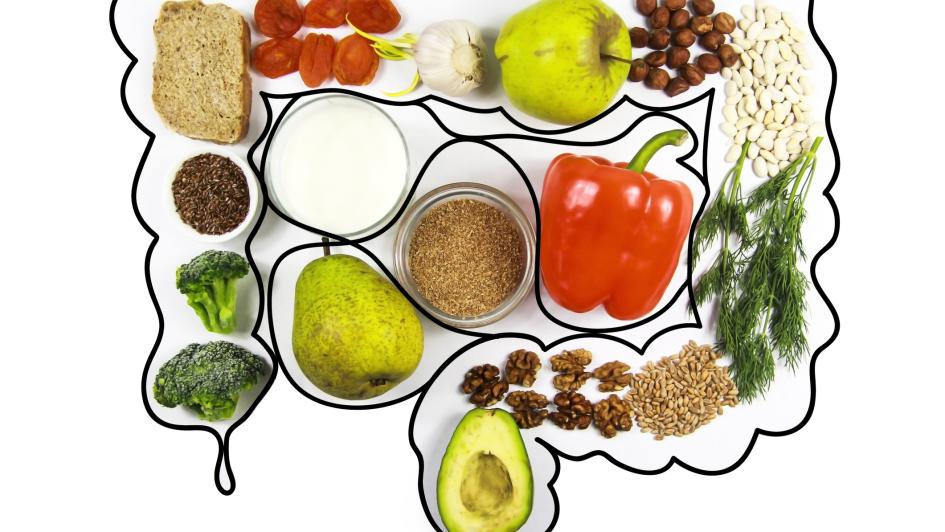3 Ways to Improve Gut Health with Whole Foods

Published
Remember when your mother always told you to “trust your gut?” Turns out, she was right! Good health starts in your gut. Unfortunately, gastrointestinal discomfort such as constipation and gastroesophageal reflux disease (GERD) are some of the largest health complaints in the United States. Luckily, a diet focusing on whole foods may help alleviate some of the associated symptoms.
Did you know your gut performs functions other than digestion? It is responsible for supporting a strong immune system, absorption of essential nutrients, and it even aids in managing our mood through the production of serotonin and other neurotransmitters. Keeping your gut healthy is one of the most important things you can do to achieve optimal health. Luckily, this can be done by doing one of my favorite activities, eating! Here are three ways to help ease digestion, prevent and treat constipation, and aid in gut nourishment.
To Ease Your Digestion
The following foods are helpful for enhancing digestion and reducing bloating and gas after eating:
-
Papaya: Papaya contains papain, an enzyme that helps digest protein; it may also help prevent heartburn, and relieve constipation.
-
Pineapple: Pineapple contains bromelain which aids in protein digestion and intestinal disorders.
-
Ginger: Ginger is most commonly known to help with motion sickness and nausea. However, it can also aid in digestion by breaking down and expelling gas.
-
Aloe Vera: Yes you read that correctly! Aloe Vera juice is not just beneficial for sunburns, it also cools the burning sensation in your esophagus related to acid reflux.
Focus on Fiber
Easing digestion is just the first step in improving gut health. Next, we need to keep the process moving, quite literally. Fiber helps keep you regular, aids in elimination and supports the health of the cells in the colon. A diet high in fiber may decrease the risk of colon cancer and may help manage symptoms related to irritable bowel syndrome and gallstones. Treating and preventing uncomfortable feelings associated with constipation can be as easy as eating the right foods! The following are delicious ways to boost fiber:
-
Fruit: Raspberries, strawberries, apples, banana, orange, plums, cherries, peach, avocado, figs, pears.
-
Vegetables: Broccoli, green leafy vegetables (spinach, kale, lettuce), green beans, celery, corn, squash, Brussels sprouts, sweet potato, okra, peas
-
Whole Grains: Whole grain bread, oatmeal, grape nuts, bulgur, quinoa.
-
Legumes: Navy beans, kidney, lentils, black beans, pinto beans, lima beans, chickpeas soybeans
-
Nuts and Seeds: Chia seeds, flax seeds, hemp seeds, walnuts, almonds.
Keep Your Gut Nourished
Now that we know a few foods to consume to ease digestion and constipation, let's talk about how to keep your gut well nourished to fight infection and boost your mood. Probiotics improve gastrointestinal health by adding live beneficial bacteria into the intestinal normal flora. Probiotics have many positive effects on the body, such as improving digestion, supporting immunity, increasing metabolism, supporting blood sugar control, as well as positively affecting your mood. Prebiotics stimulate the growth and activity of healthy bacteria in the colon. Feeding the good bacteria with prebiotic foods can help maintain the correct balance of bacteria and keep you feeling healthy and happy. Check out the list below of great probiotic and prebiotic sources.
-
Probiotics: Yogurt, Kefir, Kombucha, Sauerkraut, Kimchi, Miso and tempeh, Raw apple cider vinegar.
-
Prebiotics: Whole grains such as oatmeal, Flax and barley, Greens such as dandelion greens, Berries, Bananas, Legumes, Onions, Garlic, Honey.
A healthy gut begins with what you put into it. If you enjoy eating as much as I do, keep these foods in mind while you eat your way to a happy and healthier gut! If you have any digestive discomfort you would like assessed, our specialists at Bastyr Clinic for Natural Health or Bastyr University Clinic would love to assist you.
Health Tip Written by: Dana Messmore B.S. Dietetic Intern
References:
1. Information H, Statistics H, States D, States D, Center T, Health N. Digestive Diseases Statistics for the United States | NIDDK. National Institute of Diabetes and Digestive and Kidney Diseases. 2017. Available at: https://www.niddk.nih.gov/health-information/health-statistics/digestive-diseases. Accessed November 1, 2017.
2. Bischoff S. 'Gut health': a new objective in medicine?. BMC Medicine. 2011;9(1). doi:10.1186/1741-7015-9-24.
3. Turner L. Heal Your Gut. Better Nutrition [serial online]. November 2017;79(11):68-70. Available from: CINAHL, Ipswich, MA. Accessed October 27, 2017.
4. Sartor B. Probiotics for gastrointestinal diseases. Up To Date. 2015. Accessed October 25, 2017.
5. Mahan L, Escott-Stump S, Raymond J, Krause M. Krause's Food & The Nutrition Care Process. St. Louis, Mo.: Elsevier/Saunders; 2012.

